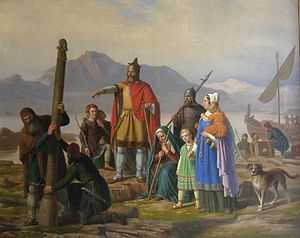Ingólfr Arnarson

Ingólfur Arnarson[1] (Icelandic pronunciation: [ˈiŋkoulvʏr̥ ˈartnar̥sɔn]) and his wife Hallveig are recognized as the first permanent Nordic settlers of Iceland. According to Landnáma he built his homestead in (and gave name to) Reykjavík in 874. Although recent archaeological finds in Iceland suggest settlement may have started somewhat earlier.
The medieval chronicler Ari Thorgilsson said Ingólfr was the first Nordic settler in Iceland, but mentioned that "Papar" – i.e. Irish monks and hermits – had been in the country before the Norsemen. He wrote that they left because they did not want to live amongst the newly arrived Norse pagans.
Landnáma (written two to three centuries after the settlement) contains a long story about Ingólf's settlement. The book claims he left Norway after becoming involved in a blood feud. He had heard about a new island which Garðarr Svavarsson, Flóki Vilgerðarson and others had found in the Atlantic Ocean. With his step brother Hjörleifur Hróðmarsson, he sailed for Iceland. When land was in sight, he threw his high seat pillars (a sign of his being a chieftain) overboard and promised to settle where the gods decided to bring them ashore. Two of his slaves then searched the coasts for three years before finding the pillars in the small bay which eventually became Reykjavík (located in South Western Iceland).
In the meantime, Hjörleifur had been murdered by his Irish slaves because of his ill-treatment of them. Ingólfur hunted them down and killed them in Vestmannaeyjar (Westman Islands). The islands got their name from that event, but vestmenn (west men) is a name that Norse men at this time sometimes used for Irishmen.
Ingólfr was said to have settled a large part of southwestern Iceland, but after his settlement nothing more was known of him. His son, Þorsteinn Ingólfsson, was a major chieftain and was said to have founded the first thing, or parliament, in Iceland. It was a forerunner of the Althingi.
The name Ingolf, similar to the name Adolf that means "aristocratic wolf", would be translated as "royal or kingly wolf."
See also
References
- ↑ Modern Icelandic spells this name with a ⟨u⟩: Ingólfur Arnarson.